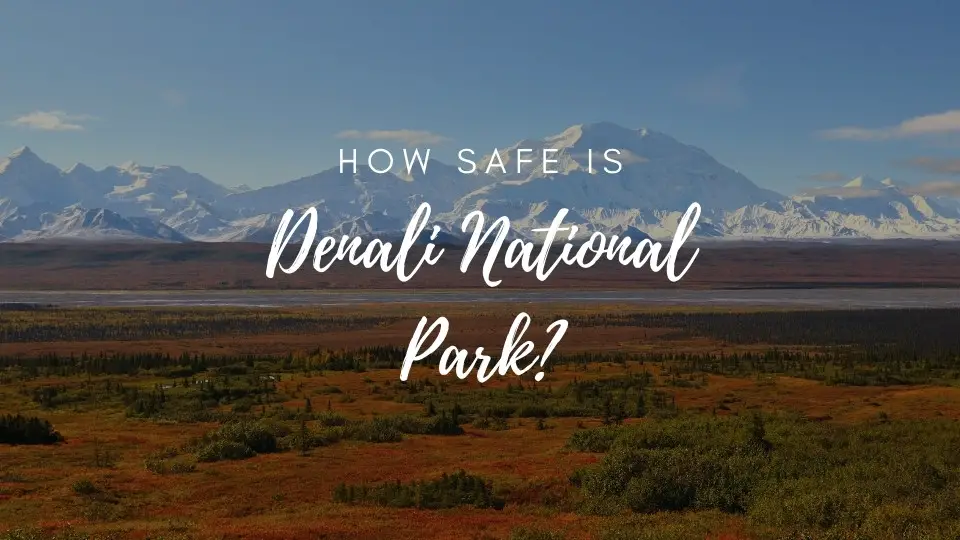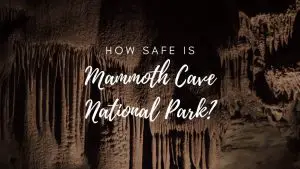Is Denali National Park Safe? (2023)

Denali National Park is one of the most popular national parks in the United States. It is located in Alaska and is known for its beautiful scenery and wildlife. Denali National Park is also one of the most dangerous national parks in the United States. So, Is Denali National Park safe?
Yes, Denali National Park is safe. However, there are some safety concerns that hikers should be aware of. We will address the concerns and safety risks of Denali National Park so that you can enjoy your trip while being safe.
Quick Links
What Are The Biggest Dangers At Denali National Park?
Denali National Park is one of the most popular national parks in the United States. It can also be one of the most dangerous. As a matter of fact, based on a per-visitor basis, it is the most dangerous national park in the United States. There are many dangers that hikers and outdoor lovers should be aware of before they visit the park
One of the biggest dangers at Denali National Park is the terrain. The park is full of steep cliffs, deep crevasses, and unstable rocks. This can make hiking and climbing very dangerous for the inexperienced. Combine that with the freezing temperatures and icy terrain, and you have a recipe for disaster.
Another potential danger at Denali National Park is the wildlife. The park is home to bears, wolves, moose, and other dangerous animals. These animals can become aggressive and may attack humans if they feel threatened. However, there haven’t been many fatalities due to wildlife attacks in the park.
Finally, the weather at Denali National Park can be very extreme. The temperatures can range from -40 degrees Fahrenheit to over 50 degrees Fahrenheit. This extreme cold is not for the faint-hearted and can cause severe conditions such as hypothermia and frostbite. The park can also be very windy, which can make it difficult to hike or climb.
Is Denali National Park Safe At Night?
Hiking and spending time in parks at night can be dangerous if you’re not prepared. Low visibility and more wildlife out at night are just some of the dangers you could face. But with suitable precautions, you can enjoy a safe and fun night hike.
But let’s clear one thing up about Alaska for those of you who are unfamiliar. During the summer months, the sun doesn’t set. However, during the winter months, the sun can set for months at a time. So, if you’re planning on hiking or spending time in Denali National Park during the winter, be prepared for darkness.
Here are some specific dangers to be aware of when hiking in Denali National Park at night:
- Wild animals: Denali is home to bears, moose, and other potentially dangerous wildlife. Be sure to make noise while hiking so they know you’re around and aren’t startled.
- Weather: At night, the temperature drops to unforgiving levels, especially up in the mountains. Be sure to dress in layers and have the proper gear for cold weather conditions.
- Cliff edges and drop-offs: In the dark, it can be easy to misjudge distances and accidentally walk off a cliff edge. Pay close attention to where you’re walking and keep away from any steep drop-offs. Falls account for nearly half of all hiking injuries.
- Getting lost: Let’s face it. It’s easy to get lost during the daytime – getting lost at night is even easier. Be sure to bring a map and compass (and know how to use them) or download a GPS app on your phone.
Is It Safe To Go Alone To Denali National Park?
When it comes to hiking, there are always risks involved – no matter where you are. But is it safe to hike alone? While there are pros and cons to hiking both with a group and solo, ultimately, it comes down to personal preference. If you’re comfortable with hiking alone, then go for it! However, there are a few things to keep in mind to ensure you stay safe while out on the trail.
For starters, always let someone know where you’re going and when you expect to be back. This way, if something happens and you don’t return when expected, someone will know to come to look for you. It’s also a good idea to carry a GPS device and/or a map of the area, even if you’re familiar with the trail. This way, if you do get lost, you’ll be able to find your way back.
As for Denali specifically, there are a few things to be aware of. The first is the terrain- at six million acres, Denali is massive, and the terrain can be very challenging. There are no marked trails in the park, so it’s essential to know your route before setting out. The second is the wildlife- while most animals in the park are not aggressive, there have been incidents of hikers being attacked by grizzly bears and other wild animals. For this reason, it’s important to be bear aware while hiking in Denali, and to carry bear spray just in case.
So, is Denali National Park safe to hike alone? Ultimately, it’s up to you. If you’re experienced, comfortable hiking solo, and take the necessary precautions, then there’s no reason you can’t enjoy a safe and fun hike by yourself.
Is It Safe To Drink Water In Denali National Park?
It’s no secret that you’re at the mercy of the elements when you’re hiking and camping in the wilderness. Water is one of the most important things to have on hand to stay hydrated, but is it safe to drink water from natural sources like rivers and lakes? In short, it depends.
There are many risks associated with drinking untreated water in the wild. Waterborne illnesses like giardia and cryptosporidium are common and can cause severe diarrhea and vomiting. These illnesses are often found in stagnant water sources or water that contains animal feces. Drinking contaminated water can also lead to more severe illnesses like dysentery, cholera, and typhoid fever.
To avoid getting sick, it’s important to purify water from natural sources before drinking it. There are many ways to purify water, including boiling, filtering, and using chemical treatments. Boiling water for at least one minute is the most effective way to kill bacteria and viruses. Filtering water with a coffee filter or water purifier can also remove harmful contaminants. Chemical treatments like iodine and chlorine can also be used to purify water but should be used according to package directions.
The Wildlife Of Denali National Park
Denali National Park is home to a variety of different wildlife. Some of the most common animals that you may encounter are moose, caribou, grizzly bears, black bears, dall sheep, and wolves. While most of these animals are harmless, there are a few that you should be aware of.
Grizzly bears and black bears are the two most common bears you will see in the park. Both are considered dangerous, but brown bears are more likely to be aggressive. If you see a bear, do not approach it and give it a wide berth. Do not try to run from a bear, as they can run faster than you. If a bear does attack, fight back with everything you have.
Wolves are also common in the park, but they are generally not a threat to humans. However, you should still take precautions when hiking, such as making noise to avoid startling a wolf and keeping your food stored away so that they are not attracted to your campsite.
While most of the wildlife in Denali National Park is harmless, you should always be aware of your surroundings and take precautions when hiking or camping in the park. Most wildlife tend to be very territorial, so it’s important not to intrude on their space. If you do see wildlife, enjoy them from a distance and don’t try to approach or feed them.
Hiking Safety Tips For Denali National Park
When hiking in Denali National Park, there are a few key things to keep in mind in order to stay safe.
- First, always hike with a partner. It’s much more fun to hike with someone else anyway, and if something happens, you’ll have someone there to help.
- Second, make sure you’re prepared. Know your route and ensure you have plenty of food, water, and clothing. This is especially important in a park like Denali, where the elements can be extreme.
- Third, be aware of your surroundings. If you see a bear or other wild animal, do not approach it. Give it plenty of space and enjoy watching from a distance.
- Lastly, have a plan. If you get lost, make sure someone knows where you’re going and when you expect to return. It’s also a good idea to bring a map and compass or bring an actual GPS (not just your phone).
Conclusion
In conclusion, Denali National Park can be safe for those looking for their next frigid getaway. However, just like any other park – respect the elements, respect the wildlife, and be extra prepared with food, water, and the proper clothing for your journey. By following these simple tips, you can rest assured that you’ll have a safe and fun time in Denali National Park.






